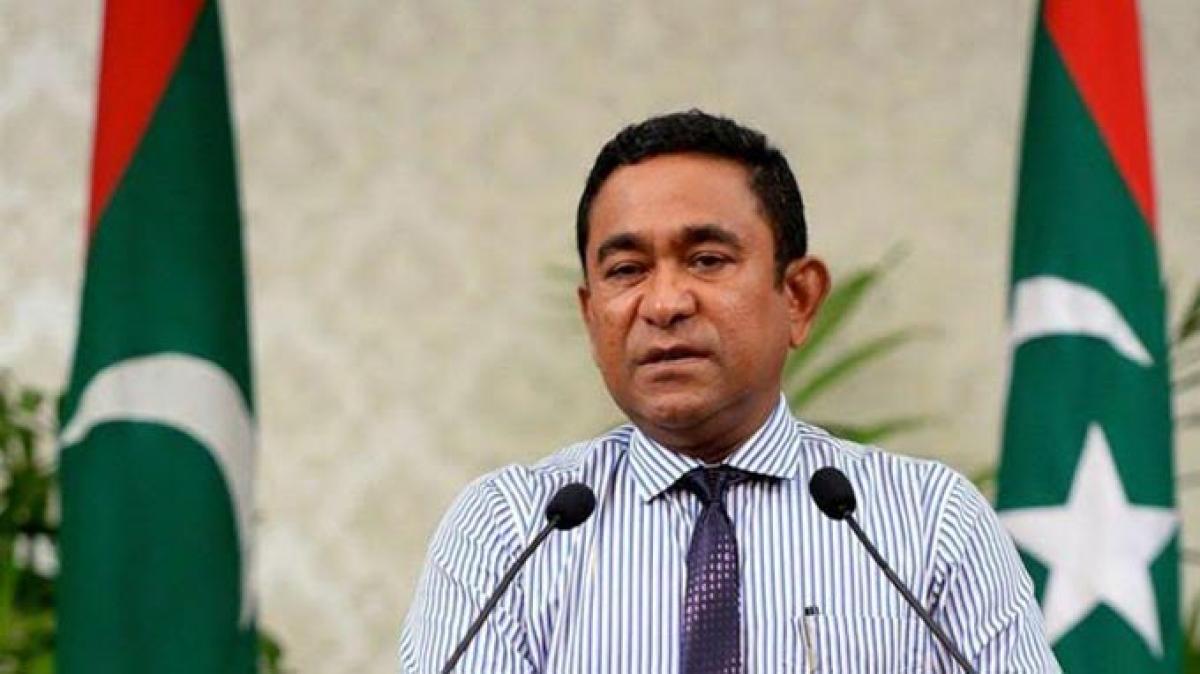Live
- Omar Abdullah Urges Congress To Earn INDIA Bloc Leadership Role
- Yogi Adityanath Contrasts Historical And Modern Treatment Of Workers In India
- Historic Temple In Sambhal Reopens After 46-Year Closure Following 1978 Riots
- Officials directed to work for deeper reach of guarantees
- Delay In 'One Nation, One Election' Bills Introduction Announced
- Exhilarating ‘Benchmark’ of Venkat Changavalli
- Development activities worth `30 cr launched in Puthalapattu constituency
- Allegations against KTR baseless: BRS leader
- Megastar Chiranjeevi to Visit Allu Arjun’s Residence at 12 PM Today
- Nilima Rane: Trailblazer in Nursing
Just In

Whatever is happening in Maldives may well be described by the Yameen government as the internal matter of that country, but India has to be concerned.
Whatever is happening in Maldives may well be described by the Yameen government as the internal matter of that country, but India has to be concerned. The imposition of emergency in Maldives by the Yameen dispensation is of course a matter pertaining to Maldives and the Maldivians but India is directly affected by the political churning that is going on in the Indian Ocean archipelago.
 Political upheaval in Maldives necessarily has India as an interested party because of the huge strategic interests that India has in Maldives. The first and foremost of these is that Maldives does nothing which goes contrary to Indian national interests. A politically unstable Maldives is definitely not in Indian interests as foreign players and non-state actors can exploit the current situation to their advantage.
Political upheaval in Maldives necessarily has India as an interested party because of the huge strategic interests that India has in Maldives. The first and foremost of these is that Maldives does nothing which goes contrary to Indian national interests. A politically unstable Maldives is definitely not in Indian interests as foreign players and non-state actors can exploit the current situation to their advantage.
Yes, India has not made any formal statement about the ongoing political churning in Maldives, not even last week when President Yameen arrested his own Vice-President Adeeb, his number two, on charges of “high treason”. That is because India doesn't want to be seen as dabbling with the internal politics of this South Asian neighbour.
But President Abdulla Yameen Abdul Gayoom is getting more and more emboldened and ambitious. He has not only arrested his own deputy on sedition charges but has also imposed a state of emergency for a period of 30 days, with an eye on impeaching Adeeb, which has eventually happened making Adeeb the second Vice-President to get impeached.
All this is actually a part of the larger game plan of president Yameen. He clearly wants to consolidate his grip over the country. It doesn't matter to him if he is seen as a dictator by the international community by choreographing such moves.
This must definitely be a red rag for India, particularly when such developments are reported from a neighbouring democratic country like Maldives because a dictator at the helm of such a strategically crucial country in these times of jihadist brand of terrorism is more prone to taking extreme steps and join hands with such outfits to save his own skin.
Besides, Yameen's dalliances with China are an open secret. Worse, Maldives’ RTV has announced cessation of its broadcast in protest against curbs on the free expression. This step of RTV has the potential of unleashing Maldives’ own Arab Spring.
All this – the arrest of Adeeb, the imposition of emergency and the impeachment of Adeeb – was triggered by the presidential boat bombing on September 28 in which president Yameen escaped unhurt. Adeeb has been made a sacrificial goat in this case, though the Yameen government is yet to provide evidence for Adeeb’s involvement in the case.
But now the Yameen government is getting more ambitious and trying to drag the main opposition party, the MDP, in the case. This was evident on October 6 when President Yameen’s coalition partner, Ahmed Shiyam, alleged that MDP was involved in the explosion aboard the Presidential boat on 28 September.
According to MDP spokesman Hamid Abdul Ghafoor, “The MDP finds it worrying when a senior coalition partner of the Yameen administration, which has used national security threats to eliminate its political opponents, accuses the largest political party in the Maldives of terrorism.
The ongoing political upheaval in Maldives is a worrying sign for India. The world's largest democracy cannot remain silent over the systematic murder of democracy in a neighbouring country like Maldives. India has not waded into the Maldivian political crisis thus far and not even issued a statement in this regard thus far. But the question is how long can India keep quiet?
By Rajeev Sharma

© 2024 Hyderabad Media House Limited/The Hans India. All rights reserved. Powered by hocalwire.com







